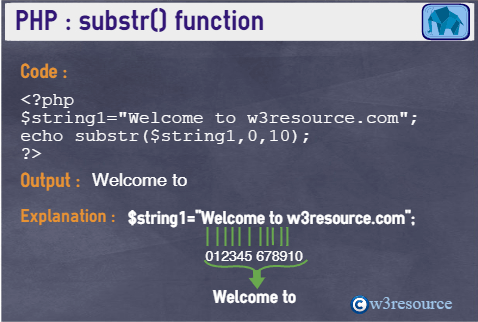PHP: substr() function
PHP: Return part of a string
The substr() function used to cut a part of a string from a string, starting at a specified position.
Version:
(PHP 4 and above)
Syntax:
substr(string_name, start_pos, length_to_cut)
Parameters:
| Name | Description | Required / Optional |
Type |
|---|---|---|---|
| string_name | The input string. | Required | String |
| start_pos | Refers to the position of the string to start cutting. A positive number : Start at the specified position in the string. A negative number : Start at a specified position from the end of the string. |
Required | Integer |
| length_to_cut | Length of the string to cut from the main string. A positive number : Start at the specified position in the string. A negative number : Start at a specified position from the end of the string. |
Optional | Integer |
Return value:
Returns the extracted part of string and false when failure.
Value Type: String.
Pictorial Presentation

Example - 1:
<?php
$string1="Welcome to w3resource.com";
echo $string1;
echo '<br>';
echo substr($string1,1);
echo '<br>';
echo substr($string1,1,5);
echo '<br>';
echo substr($string1,0,10);
echo '<br>';
echo substr($string1,-1,1);
echo '<br>';
?>
Output:
Welcome to w3resource.com elcome to w3resource.com elcom Welcome to m
View the example in the browser
Example - 2 :
<?php
$string1="Welcome to w3resource.com";
echo $string1;
echo '<br>';
echo substr($string1,0,-1);
echo '<br>';
echo substr($string1,3,-3);
echo '<br>';
echo substr($string1,4,-4);
echo '<br>';
echo substr($string1,-3,-2);
echo '<br>';
?>
Output :
Welcome to w3resource.com Welcome to w3resource.co come to w3resource. ome to w3resource c
View the example in the browser
Example - 3 :
<?php
$string1="Welcome to w3resource.com";
echo $string1;
echo '<br>';
echo substr($string1,-1);
echo '<br>';
echo substr($string1,-4);
echo '<br>';
echo substr($string1,-5,1);
?>
Output :
Welcome to w3resource.com m .com e
View the example in the browser
See also
Previous: substr_replace
Next: trim
